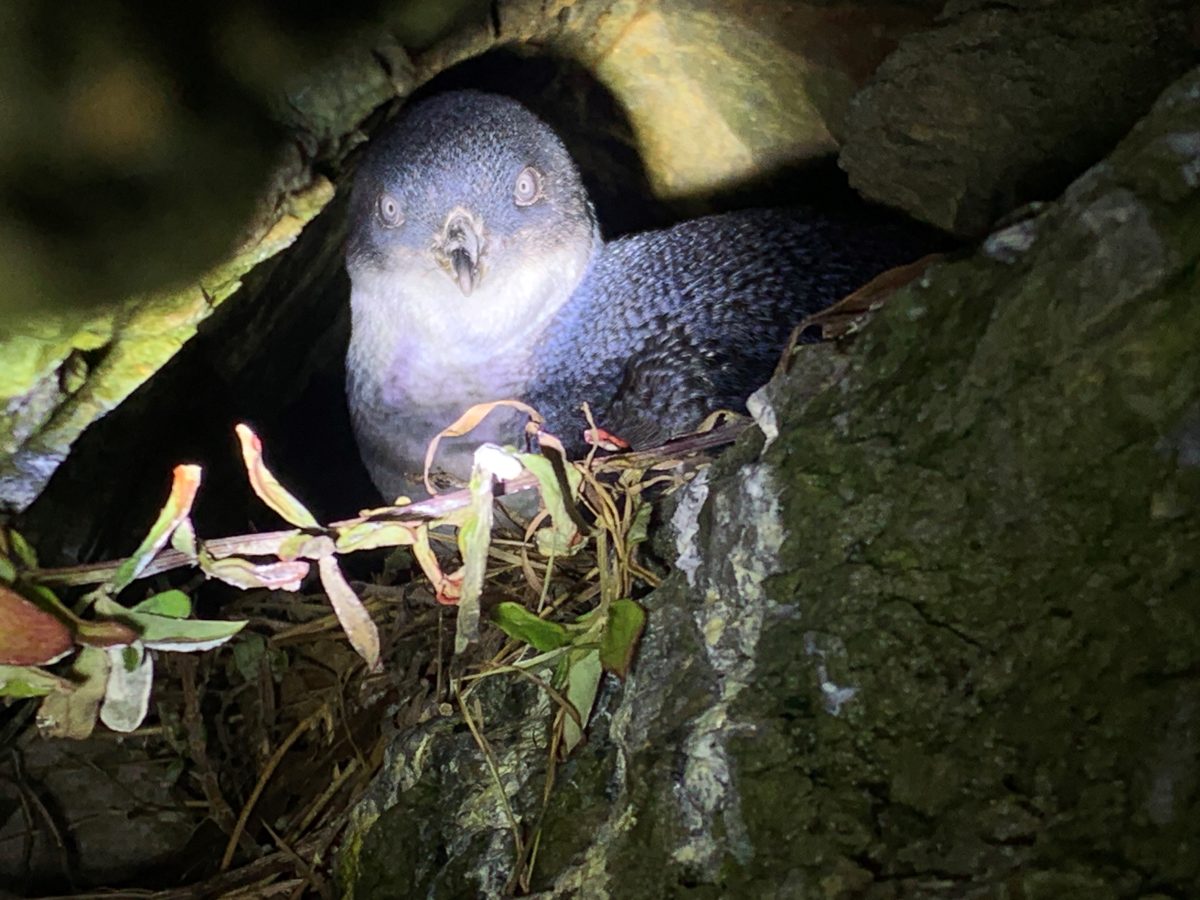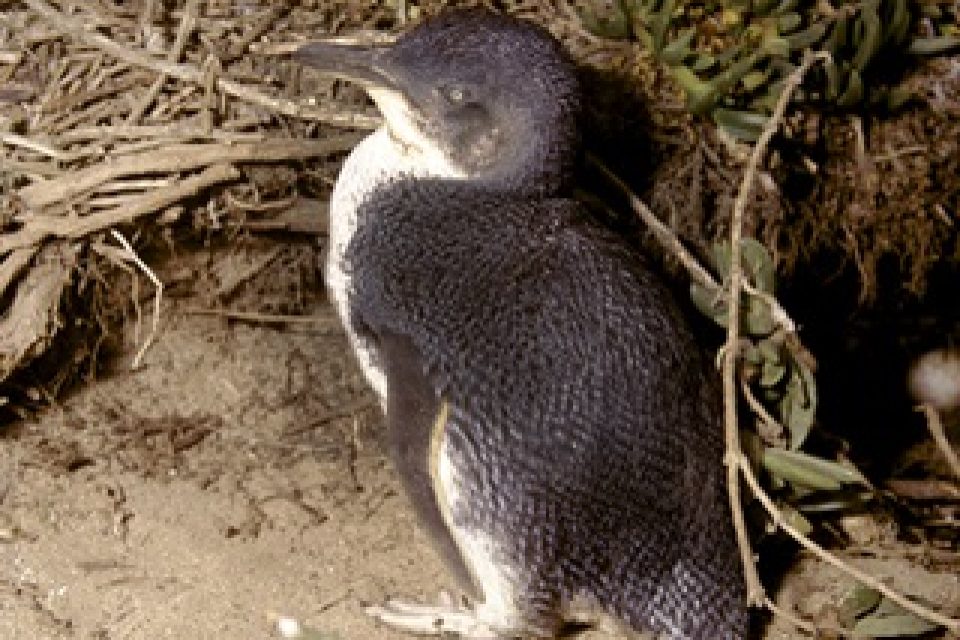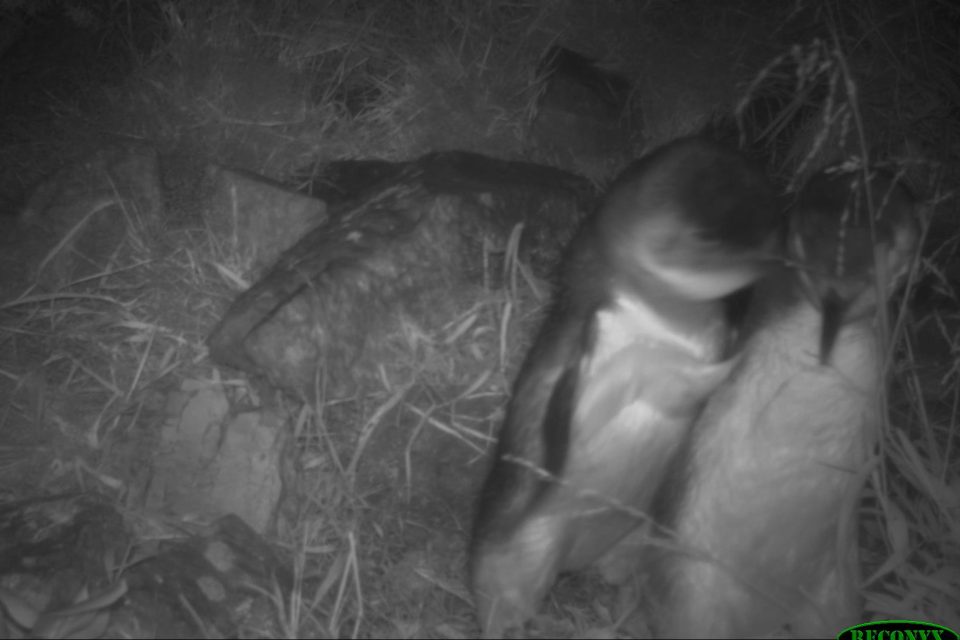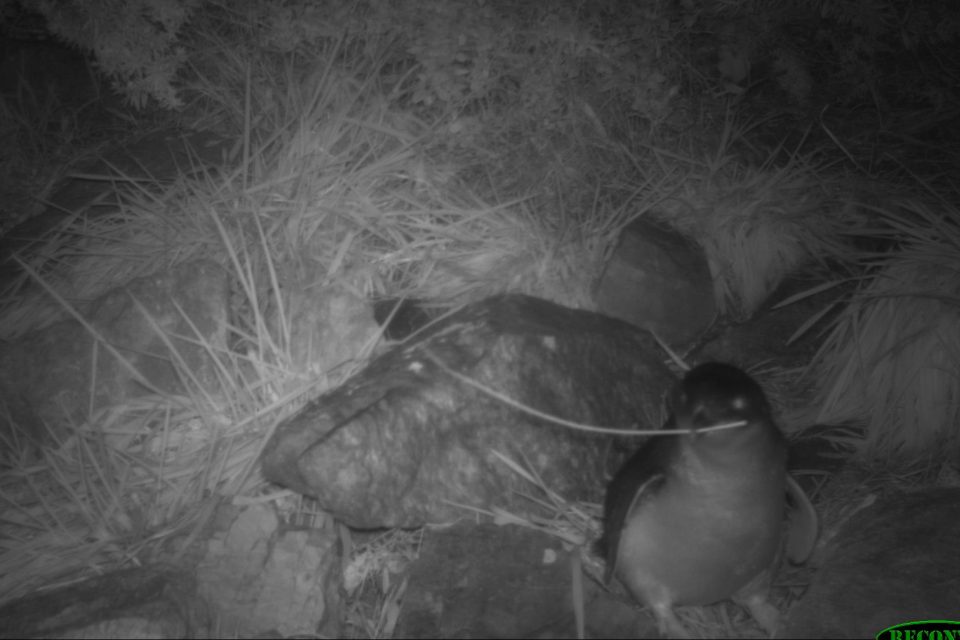
The Little Penguin mother sitting on her own nest under a boulder in Twofold Bay. Photo: DPE.
A pair of loved-up Little Penguins are the first to hatch a chick in Eden’s Wheel Cove since the Twofold Bay breeding colony was wiped out in the early 1990s.
The couple was first spotted at the sheltered cove near the Eagles Claw Nature Reserve in December 2022 and night-vision cameras caught them preparing a nest under a boulder at the base of a cliff.
NSW Department of Planning and Environment’s senior research scientist and penguin expert Nicholas Carlile said cameras captured the pair bonding in courting rituals and later collecting materials for their nest.
“Things started really heating up in July when we captured hundreds of images of the birds carrying nesting material into the site. That’s when things started looking good,” he said.
“We have been able to keep an eye on the loved-up pair over the last few months, and eventually saw them lay and tend to two eggs.”
Nicholas hoped the chick, born in late September, would be the first of many to hatch in Eden.
“This is the beginning of what will hopefully be a wonderful relationship between the Little Penguins and Wheel Cove,” he added.
He said although researchers had placed artificial nesting boxes in the area, the pair chose to go it alone and build their nest under the boulder, which, unfortunately, resulted in one of the eggs rolling out.
The successful hatching is the culmination of many years of hard work to create and restore nesting habitat in Twofold Bay, which was home to 500 penguins back in 1935. The penguins were declared extinct in Eden in 1995 after being wiped out by foxes and dogs.
Merimbula National Parks and Wildlife Service ranger Wendy Noble has led efforts to attract penguins back to Twofold Bay and to create a safe nesting ground.
A 90-metre fence was erected around the sheltered south-facing cove to protect the penguins from predators. A solar-powered ”love machine” – a sound-attraction device – was also installed to echo Little Penguin mating calls across the bay each night to encourage them to visit and breed.
“We knew they were out there,” Wendy said.
“Fishermen and kayakers had reported seeing and hearing the penguins in the bay, so we wanted to create a safe space for them to return to.
“The fence was built just prior to the Black Summer fires, and I think we got in just in the nick of time.”
Nicholas said other Little Penguin pairs had been spotted in the cove, but had not shown signs of nesting this year.
“We hope they’ll come back next year and we’ll see more Eden chicks,” he said.
“What we’re doing to attract the penguins is definitely working, now it’s just a matter of keeping them safe.”
Wendy has been working with Bega Valley Council, Eden Marine High School, and local environmental and seabird groups to establish the site, and is keen to form a Friends of Penguins group to get more community members involved.
“We need people to raise awareness about the penguins and also to help fundraise for equipment,” she said.
“We would like to install permanent cameras at the site so we can live-stream and see what the penguins are doing.
“It would be great for the locals to take ownership and say, OK, they’re our penguins and we’re going to look after them.”




Nicholas said Wendy was a “passionate conservationist” who had been “absolutely integral” to the establishment of the breeding program over the past five to 10 years.
“This whole success has been driven locally,” he said.
“It’s really now a case of the community getting more involved in the friends group and keeping their dogs on a leash.”
He said the dedicated DPE team would continue to support the Little Penguins’ return to the “very unique, very precious mainland breeding site”, which was incredibly steep and dangerous to access.
“We’d love to see 10 pairs of birds nesting in the cove,” Nicholas added.
The nearest Little Penguin colonies are on Montague Island to the north and Gabo Island to the south, and it’s likely the pair came from one of those sites.
The DPE and council rangers will continue to monitor the penguin pair and their chick over the coming weeks.
Member for Bega Dr Michael Holland has welcomed the lovebirds.
“It’s absolutely wonderful to hear that they not only nested and laid an egg, but also produced a little chick,” he said.
“We hope this marks the start of a new generation of penguins at Eden.”
Little Penguins were once more common on the Australian mainland, but their colonies are now generally restricted to offshore islands. Until now, the only known mainland breeding colony in NSW was in a secluded cove at Manly, in Sydney Harbour, which has been declared an endangered population.
Standing about 30 to 35 cm in height, the birds weigh around one kilogram when fully grown, while the males are slightly larger than the females.
Its upper body and flippers are slate blue or blue-grey, with the underside and throat being white. The bill is black, its feet are pale pink, and its eyes are silvery-grey.
The Little Penguin makes a variety of noises for different situations, including short, sharp barks when at sea and a variety of throbbing growls and hoarse whoops when attracting a mate. If it is disturbed, it will let out a sharp, snorting yelp.
Anyone keen to be involved in the planned Friends of Penguins group should contact the Merimbula NPWS office on 6495 5000.
Original Article published by Katrina Condie on About Regional.












